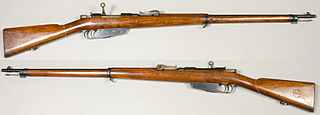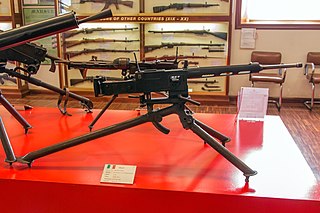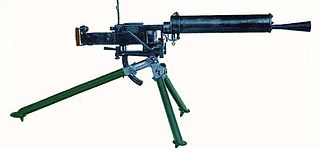Related Research Articles

Carcano is the frequently used name for a series of Italian bolt-action, internal box magazine fed, repeating military rifles and carbines. Introduced in 1891, the rifle was chambered for the rimless 6.5×52mm Carcano round. It was developed by the chief technician Salvatore Carcano at the Turin Army Arsenal in 1890, and was originally called the Modello (model) 91 or simply M91. Successively replacing the previous Vetterli-Vitali rifles and carbines in 10.35×47mmR, it was produced from 1891 to 1945. The M91 was used in both rifle (fucile) and shorter-barreled carbine (moschetto) form by most Italian troops during World War I and by Italian and some German forces during World War II. The rifle was also used during the Winter War by Finland, and again by regular and irregular forces in Syria, Libya, Tunisia, and Algeria during various postwar conflicts in those countries.

The Fucile Mitragliatore Breda modello 30 was the standard light machine gun of the Royal Italian Army during World War II. The Breda Modello 30 was issued at platoon level and gave Italian rifle squads extra firepower. As a light machine gun it had many problems including jamming and overheating. It was fed by a 20 round stripper clips which had to be oiled by a lubrication device. Despite all its faults it formed the main base of fire for infantry units during the war.

The Moschetto Automatico Revelli-Beretta Mod. 1915 was a self-loading carbine that entered service in 1918 with the Italian armed forces. Designed as a semi-automatic carbine, the weapon came with an overhead inserted magazine, an unconventional design based on the simplicity of allowing a spent round to be replaced using assistance from gravity. The gun was made from half of a Villar-Perosa aircraft submachine gun.

The L3/35 or Carro Veloce CV-35 was an Italian tankette that saw combat before and during World War II. Although designated a light tank by the Italian Army, its turretless configuration, weight and firepower make it closer to contemporary tankettes. It was the most numerous Italian armoured fighting vehicle and saw service almost everywhere the Italians fought in World War II but proved inadequate for modern warfare, having too thin armour and weak armament of only machine guns. It was cheaply produced but because of its light armaments and armour it was reserved to mostly colonial, policing, reconnaissance, and supply duties. However, given its low production costs, proved to be efficient in the Second Italo-Abyssinian War, Spanish Civil War and the Greco-Italian War where it provided reliable support to Italian infantry and disrupted enemy lines.

The Pistola Mitragliatrice Fiat Mod. 1915, commonly nicknamed the Villar Perosa, was an Italian portable automatic weapon developed during World War I by the Officine di Villar Perosa.

The Mitragliatrice Breda calibro 8 modello 37 was an Italian Medium machine gun produced by Breda and adopted in 1937 by the Royal Italian Army. It was the standard heavy machine gun for the Royal Italian Army during World War II, and continued to be used by the Italian Army after the conflict.

The Royal Italian Army, reformed in 1861 and existed until 1946, participated in World War II. The Royal Army started with the unification of Italy (Risorgimento) and the formation of the Kingdom of Italy. It ended with the dissolution of the monarchy. The Royal Army was preceded by the individual armies of the independent Italian states and was followed by the Italian Army of the Italian Republic.

The Fiat–Revelli 35 was an Italian machine gun, a modified version of the Fiat–Revelli Modello 1914, which had equipped the Italian Army of World War I. It was a vast improvement on the early model, offering superior penetration power due to the adoption of belt fed 8mm (8x59) rounds. The Modello 35 also omitted the oil reservoir found on the earlier Modello 14. Later it was found that the new chamber still jammed and rounds had to be lubricated before use. Despite its faults the Modello 35 saw extensive action during World War II.

The Carabinetta Automatica O.V.P was a submachine gun developed in Italy.

The Fiat–Revelli Modello 1914 was an Italian water-cooled medium machine gun produced from 1914 to 1918. It was the standard machine-gun of the Italian Army in World War I, and was used in limited numbers into World War II. The ammunition was fed from an awkward large box magazine, which could hold 50 rounds and fired the same 6.5mm round issued for the Carcano rifle. Like many machine guns of that period, it was water cooled and somewhat cumbersome.
8×59mmRb Breda was an Italian heavy arms cartridge. It is unusual in that it is one of the small number of cartridges designed with a rebated rim, meaning the rim of the cartridge is smaller in diameter than the body of the cartridge. The "Rb" in the designation stands for "rebated rim".

Tanks have been employed by the military forces in Italy since their first use in World War I. They have had continued use in wars after and are still used through the modern day. The C1 Ariete is the current main battle tank of the Italian Army.

The Breda 5C was an Italian medium machine gun, which was adopted by the Royal Italian Army and used in the Second Italo-Ethiopian War and in World War II.
References
- ↑ Poggiaroni, Giulio (2020-04-18). "Carcano Rifle Series of the Regio Esercito". Comando Supremo. Retrieved 2021-07-28.
- ↑ "Rifle: Austro-Hungarian Steyr-Mannlicher M.95 - C&Rsenal : : C&Rsenal". candrsenal.com. Archived from the original on 22 December 2016. Retrieved 27 February 2024.
- ↑ JDG (2010-03-08). "Beretta M1918 Submachine Gun". Comando Supremo. Retrieved 2021-07-29.
- ↑ "Beretta Mod. 1918-1930 automatic carbine". firearms.96.lt. Retrieved 14 February 2024.
- ↑ "Beretta Model 1934". www.militaryfactory.com. Retrieved 2021-07-28.
- ↑ "CMR Classic Firearms :: Bodeo 1889 Mod Bernadelli Italian Service Revolver. Ref#1br". www.cmrfirearms.com. Retrieved 2021-07-28.
- ↑ H, Jim (2018-12-17). "Fucile Mitragliatore Breda 30". Comando Supremo. Retrieved 2021-07-29.
- ↑ Poggiaroni, Giulio (2020-05-29). "Fiat–Revelli Modello 1935 History and Specifications". Comando Supremo. Retrieved 2021-07-29.
- ↑ "Mitragliatrice Breda Mod 5C 5G 1930 | PDF". Scribd. Retrieved 5 March 2024.
- ↑ H, Jim (2018-12-02). "OVP 1918 Submachine Gun". Comando Supremo. Retrieved 2021-07-29.
- ↑ Press, Merriam (2017-10-28). World War 2 In Review No. 25: Italian Fighting Vehicles. Lulu Press, Inc. ISBN 978-1-387-32816-1.
- ↑ "THE SECOND ITALO-ABYSSINIAN WAR, OCTOBER 1935-MAY 1936". Imperial War Museums. Retrieved 2021-08-02.